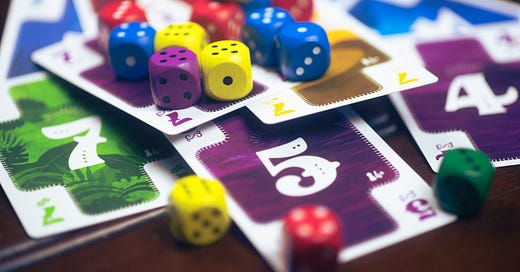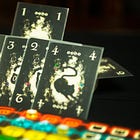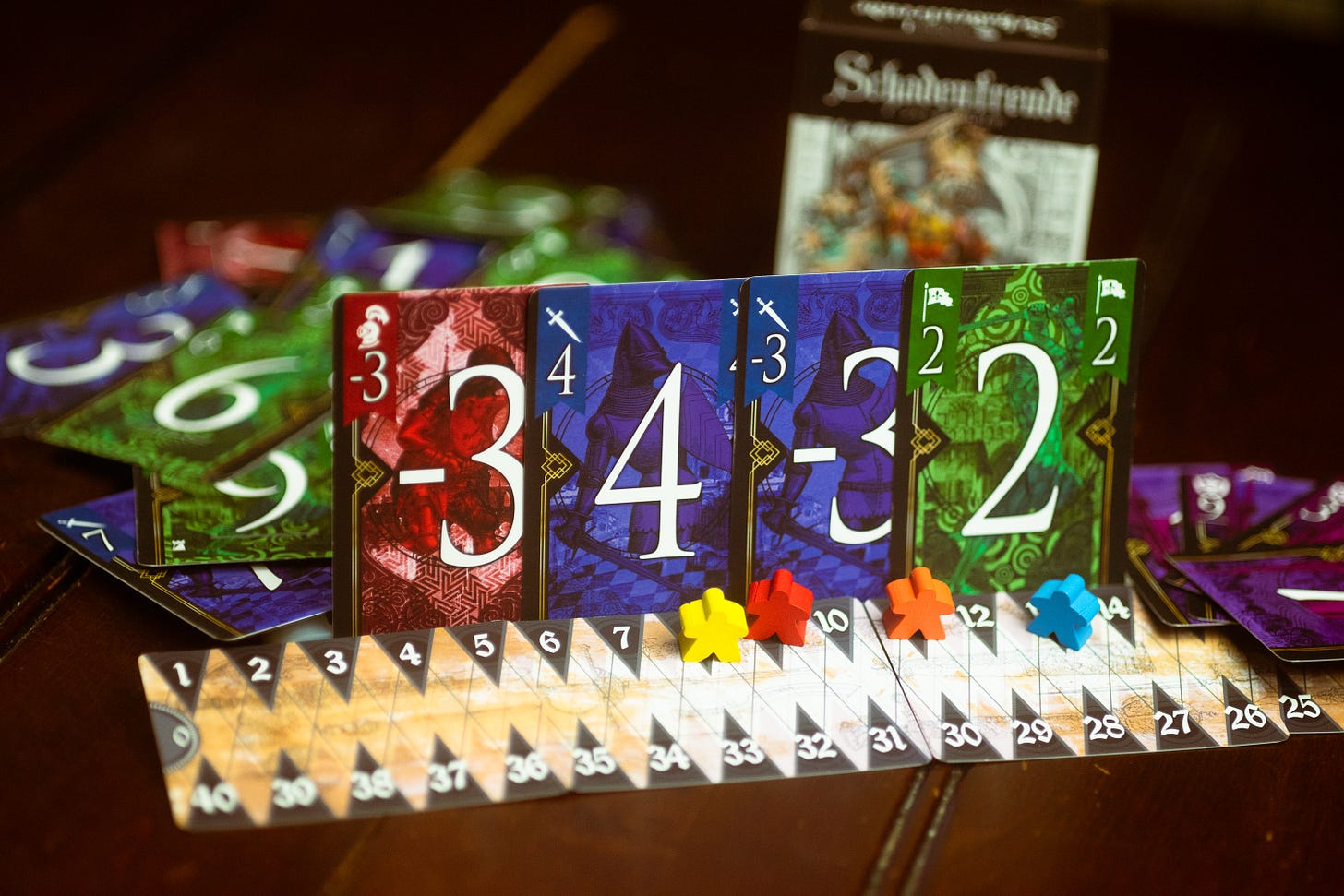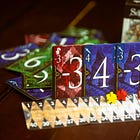Four games to replace the classic card game Hearts
Hearts is great, but these four games are newer and shinier.
In November, I wrote about replacing Spades with some great trick-taking games, and at that time, I threatened to write a sequel to that post. The time has come for said sequel.
As we look at games to replace Hearts, we should first try to understand the unique appeal of Hearts. I like Hearts, and replacing it isn’t about getting rid of one of the great trick-takers. “Replacing the classics” is a bit of a misnomer here, just as it was when I talked about replacing Spades.
The two major features with which we’ll be chiefly concerned here include:
Trick avoidance — the heart suit is worth points, which you want to avoid, as points are bad. You also really want to avoid the Queen of Spades, which is worth a ton of points.
Shooting the moon — if you take all of the hearts and the Queen of Spades, you take zero points for the round, and everyone else takes 26. It’s a real high-risk, high-reward situation, because if you fail to take all of them, you’re just going to end up with a lot of points. Speaking more generally, shooting the moon generally refers to achieving a more difficult objective that, if attempted but not achieved, would leave the player in a significantly worse-off position.
Obviously there’s more to Hearts than simply avoiding tricks and shooting the moon, but those are the features on which we’ll focus as we find four great games to replace Hearts.
First up is the excellent Japanese title Nokosu Dice (2016), which combines dice and cards in a way that’s reverberated through trick-taking since its emergence. At the beginning of each round, you’ll be drafting dice, which you’ll largely use just as you would cards — they’re just additional things you can play to a trick. It’s a must-follow game, which means each player following must, if able, play the same suit as the lead player. However, because your dice are visible to all players, your opponents will know at least some of the options you have available. One of your dice will be used to place a bid on how many tricks you think you’ll win — but if you think you can win zero tricks, you can declare that at the beginning of the round. It’s worth more points than any other method, and it’s really exciting when you’re able to hit that mark. It’s also exciting when you don’t hit that mark, but perhaps more for other players than for yourself.
Nokosu Dice predates a fair amount of the trick-taking renaissance that we know today. While it’s hard to see the direct line between games like The Crew (Sing, 2019) and Nokosu Dice, we can see a clear family resemblence with this and games like Cat in the Box (Yokouchi, 2020) or American Bookshop (Shinzawa, 2019). Nokosu Dice still reverberates throughout trick-taking, despite designer Yusuke Matsumoto taking eight years to release a second game. There’s something about Nokosu Dice that just works so well that it garners a significant amount of attention, and rightly so.
Unfortunately, Nokosu Dice is not broadly available in the United States, so you’ll have to explore importing avenues. It’s also a game you can proxy, should you desire — the rules are available online, and the components are not too unusual. I’d still urge you to pick up the game if you’re ever able, of course. Designed by Yusuke Matsumoto, illustrated by Sai Beppu, and published by Engames.
We move now to the best ‘Hearts-like’ game on the list, Rebel Princess (2023), which is essentially a themed spin on the game. Gone are the classic suits, replaced here by queens, princes, fairies and animals. Princes are bad, in that you score undesired points for them. The eight of animals is an enchanted frog, who scores you (again, undesired) a bunch of points. The premise is Hearts with scoring tweaks and an eye toward variety, and it really works.
Each round you play has a special condition that changes gameplay in some important way, too. It may lack the cold, hard repeatability of Hearts, but it makes up for it with something that feels consistently fresh and often unusual. Whether you’re forced to follow face-down, have access to just half your cards for the first half of the round, or following a card’s evenness or oddness, you’re going to find the game’s feeling shift regularly. Of course, that means you’ll have rounds where things just don’t work in your favor at all, and you’ll have rounds where it works perfectly. This is not a game for folks who want to consistently outperform the opposition. It’s not Haggis (Ross, 2010) or The Crew — this is a game that feels a bit intentionally untamed.
But in that untamed feel, Rebel Princess has more in common with Hearts than any game on this list. From one pain suit (princes) that must be broken before being played, to a high-ranking extra-painful card, to being able to shoot the moon by collecting all the princes and the frog, Rebel Princess is almost just a late sequel to Hearts. Designed by Daniel Byrne, José Gerardo Guerrero, Kevin Peláez and Tirso Virgós; illustrated by Alfredo Cácares, and published in the U.S. by Bezier Games.
Schadenfreude (2021) has been one of my favorites after I was introduced; it’s a must-follow trick-taking game with a bit of a race mechanic — except the winner isn’t the player who finishes the race first. See, in Schadenfreude, it’s sort of a game about not finishing first. The game ends when at least one player hits 40 points, but it’s the player who gets the closest to 40 without going over that wins. The winner of each trick is the player who’s played the second-highest card. Collecting cards is sort of a negative, as they’re worth points equal to the card rank, and that means you’re closer to going over 40, but you also need to collect points in order to come the closest to 40. Even collecting cards isn’t straightforward, because collecting cards of a duplicate rank gets rid of both cards.
Schadenfreude feels unusual and twisted. It takes classic mechanics in Hearts and just shifts things around enough that it feels unusual. Instead of the game merely ending at a certain points threshold with all players trying to pass it, it ends with players desperately clawing back at their points gained. Instead of wanting to win high-value tricks, you’re evaluating each trick individually — “can I afford to take that 9?” you’re asking yourself. You’re almost trying to shoot the moon by landing exactly at 40 points while another player goes over — it’s the high-risk, high-reward proposition the game makes. Schadenfreude isn’t always straightforward, but it always works. Designed by ctr, published by Studio Turbine.
Rounding out our list today is Seas of Strife, a trick-taker that’s undergone some significant retheming over the course of its life. It started as the relatively themeless Strife in 2015, moved to the Old West in 2018 as Texas Showdown, and ended up with its current nautical theme in 2023 after an extended period of unavailability. It’s unusual in that it’s played with eight suits with no overlap in rank, and higher-ranking suits have fewer cards in the deck. It’s a must-follow game, but it’s got a bit more going on there: Once a player has followed off-suit, other players can then follow in any of the suits played, not just the lead suit. The winning card comes from the suit with the most cards in the trick, and in the event of a tie, the highest-ranked card wins. There’s a bit more here, but that’s the gist.
The big similarity to Hearts is that this is a trick-avoidance game. Winning tricks gives you points, and you don’t want points. You also get that risk-reward continuum when you play off-suit — if you’re not the last player, will you put yourself in a position of winning a trick when you thought you’d successfully play off-suit and lose? This is one of my favorite games in larger settings, as it plays quite well at its maximum six-player count. Designed by Mark Major, illustrated most recently by Beth Sobel, and published by Rio Grande Games.
We’ll end here with a few honorable mentions.
Stick ’Em / Sticheln (Palsech, 1993) — I’ve not yet played this one, so it didn’t make the list, but the premise is that each player chooses a color of cards they don’t want to win.
Change of Heart (Wray, 2023) — This will be hard to find, but it’s very cool — it’s basically several interesting variants of Hearts. Neat!
American Bookshop (Shinzawa, 2019) — The sum of ranks in a trick can’t go over a certain threshold, and winning tricks is worth negative points unless you have a plurality or majority of cards of that suit.
Thanks for joining me this week for an afternoon edition of Don’t Eat the Meeples! I hope the week found you well. I do apologize for the lateness — I sort of suspect I ate too many jelly beans returning home on a 12-hour road trip. Whoops. At any rate, I’m largely fine now, so don’t you worry.
Next week: Taking a look at how tariffs on China have negatively impacted the board game industry, plus some games I’ve been playing recently.









